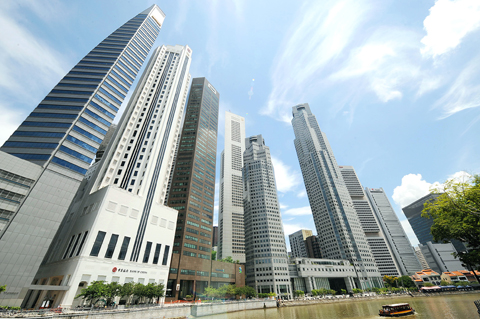Singapore’s central bank devalued its currency less aggressively than expected in a monetary policy review yesterday, signaling growing confidence that the global economy is bottoming out.
The Monetary Authority of Singapore repeated what it had done in previous downturns in 2002 and 2003 by shifting the center of the secret trade-weighted band for the Singapore dollar down to the existing level of the exchange rate basket, effectively a devaluation.
Based on their estimates of the policy band the Singapore dollar is managed in, economists said the currency might have been devalued by 1.5 percent to 2 percent.

PHOTO: AFP
Yesterday’s monetary easing came as Singapore’s economy contracted a record 11.5 percent from a year earlier in the first quarter of this year, more than a market median forecast of an 8.8 percent slump. The government expects the economy to shrink between 6 percent and 9 percent this year.
The bank said the economy is likely to remain below its potential growth rate until a decisive recovery in exports.
The policy easing appeared inadequate to most analysts. JPMorgan Chase strategist Claudio Piron said the Monetary Authority of Singapore had been conservative.
“There had been some expectation that the re-centering would be as much as a 400 basis points depreciation,” he said.
Others pointed to subtle hints of optimism in the central bank’s statement, such as the allusions to Singapore’s “sound fundamentals,” and references to a pick up in leading indicators and improved consumption in the US.
“The statement was somewhat optimistic with the usual dose of cautiousness,” said Emmanual Ng, strategist at OCBC Bank.
Other data yesterday meanwhile suggested Singapore’s open economy — exports including re-exports are double the total economic output — could be nearing a trough.
Non-oil exports (NODX) fell 17 percent from a year earlier last month after a record 35 percent plunge in January and a 24 percent fall in February. Shipments to China jumped 14 percent last month.
“Although we are seeing some faint heartbeats in the Singapore economy with better-than-expected March NODX numbers, we have not seen the bottom yet,” said Song Seng Wun (宋誠煥), economist at Malaysian bank CIMB in Singapore. “With inflation easing and external demand fragile, the shift in policy remains appropriate.”
“Given all these horrendous numbers, this policy change is not a big surprise. It is reflecting the free fall in external demand,” Song said.
The Singapore dollar, which has been emerging Asia’s second-worst performing currency this year, strengthened to a two-month high of S$1.497 against the US dollar from S$1.515 before the announcement, and was trading at S$1.5005 by 0600 GMT.

SECURITY: As China is ‘reshaping’ Hong Kong’s population, Taiwan must raise the eligibility threshold for applications from Hong Kongers, Chiu Chui-cheng said When Hong Kong and Macau citizens apply for residency in Taiwan, it would be under a new category that includes a “national security observation period,” Mainland Affairs Council (MAC) Minister Chiu Chui-cheng (邱垂正) said yesterday. President William Lai (賴清德) on March 13 announced 17 strategies to counter China’s aggression toward Taiwan, including incorporating national security considerations into the review process for residency applications from Hong Kong and Macau citizens. The situation in Hong Kong is constantly changing, Chiu said to media yesterday on the sidelines of the Taipei Technology Run hosted by the Taipei Neihu Technology Park Development Association. With

CARROT AND STICK: While unrelenting in its military threats, China attracted nearly 40,000 Taiwanese to over 400 business events last year Nearly 40,000 Taiwanese last year joined industry events in China, such as conferences and trade fairs, supported by the Chinese government, a study showed yesterday, as Beijing ramps up a charm offensive toward Taipei alongside military pressure. China has long taken a carrot-and-stick approach to Taiwan, threatening it with the prospect of military action while reaching out to those it believes are amenable to Beijing’s point of view. Taiwanese security officials are wary of what they see as Beijing’s influence campaigns to sway public opinion after Taipei and Beijing gradually resumed travel links halted by the COVID-19 pandemic, but the scale of

A US Marine Corps regiment equipped with Naval Strike Missiles (NSM) is set to participate in the upcoming Balikatan 25 exercise in the Luzon Strait, marking the system’s first-ever deployment in the Philippines. US and Philippine officials have separately confirmed that the Navy Marine Expeditionary Ship Interdiction System (NMESIS) — the mobile launch platform for the Naval Strike Missile — would take part in the joint exercise. The missiles are being deployed to “a strategic first island chain chokepoint” in the waters between Taiwan proper and the Philippines, US-based Naval News reported. “The Luzon Strait and Bashi Channel represent a critical access

Pope Francis is be laid to rest on Saturday after lying in state for three days in St Peter’s Basilica, where the faithful are expected to flock to pay their respects to history’s first Latin American pontiff. The cardinals met yesterday in the Vatican’s synod hall to chart the next steps before a conclave begins to choose Francis’ successor, as condolences poured in from around the world. According to current norms, the conclave must begin between May 5 and 10. The cardinals set the funeral for Saturday at 10am in St Peter’s Square, to be celebrated by the dean of the College